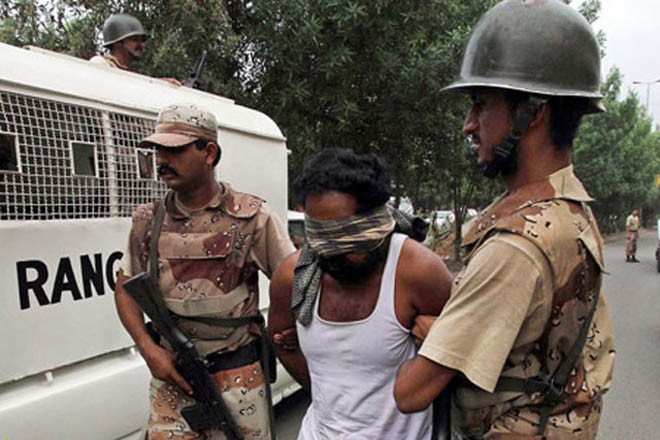

With the Rangers-led targeted operation aimed at cleaning Karachi in its third year, there appears a marked improvement in the law and order situation in the city. Ironically, there has been a simultaneous rise in extra-judicial killings in Karachi.
In September 2013, the newly-elected federal government gave special powers to the Rangers to restore peace in the city. In the beginning, the Rangers mainly focused its crackdown on the Taliban groups and criminal syndicates. But since the start of 2015, the leading political party Muttahida Qaumi Movement (MQM) has also come under their radar.
The MQM claims that since the start of the crackdown in the city, at least 56 of its workers have been killed in extra-judicial killings and whereabouts of 139 activists are not known. Rangers deny these charges. "In the last two years, law-enforcing authorities have arrested 4,788 party activists," says a central MQM leader. "3,562 of them have been released or granted bail."
Recently, Aftab Ahmed, an MQM activist and an aide to central leader, Farooq Sattar, was arrested at his house on May 1 and died two days later in the custody of Rangers. After protest by the MQM and human rights bodies, Rangers Sindh chief announced the suspension and arrest of five Rangers for their alleged involvement in the death of Ahmed.
The Human Rights Commission of Pakistan (HRCP) has asked for stopping the killing of people in encounters. While its statistics show a significant decrease in the number of targeted killings, on apolitical, political and sectarian grounds, it also states that 521 people were killed in shootouts with the law enforcement agencies in 2015 while the number of people killed in law enforcers’ encounters in the first four month of 2016 is 112.
Asad Iqbal Butt, vice-chairman HRCP, says the rise in such killings is creating unrest and undermining the credibility of law enforcement agencies. "After being empowered to keep a suspect in custody for 90 days for interrogation, there is no excuse for such killings."
Read also: Killing without trial
A senior police officer, requesting anonymity, admits the increase in killings in encounters but says that very few MQM men have been killed in encounters. "The number of Pashtuns and Baloch killed in shootouts for their alleged linkages with Taliban militants and Lyari’s criminal syndicates respectively are higher than the number of the MQM men," he says. Interviews with social activists in Baloch and Pashtun neighbourhoods in Karachi suggest the same.
Abdullah was a 32-year-old truck driver killed in an alleged police encounter on Dec 22, 2014, in the Deluxe Town area of Sohrab Goth, Karachi. That day, the police claimed killing 13 suspected militants belonging to Tehreek-i-Taliban Pakistan (TTP) and al-Qaeda.
In a meeting with his relatives, Mehsud tribesmen leaders complain they are being persecuted on the basis of their tribal background as key TTP leaders -- Baitullah, Hakimullah, Waliur Rehman and now Khan Said alias Sajna -- belonged to the Mehsud clan.
"Abdullah had nothing to do with the Taliban or any militant group. He was a truck driver who was killed when we failed to pay bribe to the police," says one of his cousins.
In Lyari, the situation is rather similar. "Law enforcement agencies kill people on a daily basis, linking them with gangs in fake shootouts," says Wajid Baloch, a social activist. "But unlike the MQM, we cannot organise protest on the killings of our dear ones."
The senior police officer says that law enforcement agencies are engaged in a fight with well-trained militants -- whether they belong to political parties, Taliban groups or criminal gangs.
At least 95 policemen have been killed in the last sixteen months in Karachi, police statistics show. Seven of them were killed on April 20 in the Orangi Town nieghhourhood when they were deputed to guard anti-polio vaccinators. "When we present them [accused] in the court, no one goes to the court as witness against them because of fear," he says.
The rural parts of Sindh also saw an increase in extra-judicial killings of nationalist workers, especially the members of banned Jeay Sindh Muttahida Mahaz (JSMM), a Sindhi separatist group led by Shafi Burfat. The recent extra-judicial killing of the JSMM members shows that the JSMM has taken strength from Baloch insurgent groups. Somehow the attention has remained more focused on Karachi and the killings in interior Sindh go unnoticed.